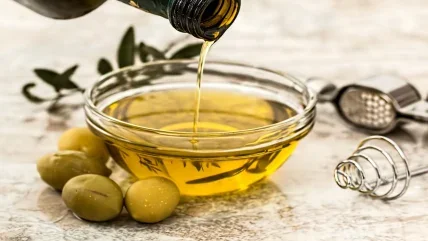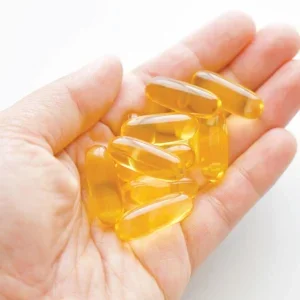
On the face of it, the assumption that the benefits bestowed by olive oil on our heart health will, in varying degrees, apply to its peers such as coconut and rapeseed oil (to name two) is a reasonable one.
In its dietary guidelines for Americans 2020–25, the US Department of Agriculture and Department of Health and Human Services examined the properties of olive, coconut, rapeseed and vegetable oils for nutrition and cooking, plus any adverse effects as well as their overall health benefits. They used the benchmark of one tablespoon (tbsp) or 15ml for each liquid.
As the report is quick to state, oils don’t contain protein or carbohydrates and are not a significant source of vitamins and minerals. Meanwhile, none of these oils – which each provided the same number of calories per tbsp – contained trans-fat, a type of fat known to be harmful to human health.
What the study also found is that the most significant difference between each of the four oils is their fat profile. Extra virgin olive oil found to have the highest in monounsaturated fats, organic virgin coconut oil contained the highest levels of saturated fats while pure vegetable oil had the most polyunsaturated fatty acids per tbsp.
The American Heart Association, for example, has previously noted that unsaturated fats, which include monosaturated and polyunsaturated fats, can reduce the risk of heart disease when people choose to eat them instead of saturated and trans fats.
Moreover, an association has been drawn between saturated fats and higher levels of lowdensity lipoprotein (LDL) cholesterol in the blood. LDL cholesterol, nicknamed ‘bad’ cholesterol for perhaps obvious reasons, is a significant risk factor for cardiovascular disease.
The risk of ‘bad’ cholesterol
This is a key issue, given the jury is still out as to whether coconut oil, as just one example, can be considered advantageous when it comes to a healthy diet in terms of promoting heart health; case in point being the very high levels of saturated fatty acids it contains.
Proponents of coconut oil counter it behaves differently than other oils containing high levels of saturated fats and in fact possesses properties such as medium-chain triglycerides.
They argue that these medium-chain fatty acids provide health benefits because the body digests and absorbs these quicker than long-chain fatty acids, making them a better energy source than long-chain triglycerides.
And yet against this backdrop, surprising research emerged in a 2022 report headed by Dr Bill Mullen, senior research fellow, cardiovascular and metabolic health at the University of Glasgow. The study found that unique amongst the sampled cooking oils – which included sunflower oil and rapeseed oil – only olive oil had a positive impact on heart health.
In addition, Mullen’s study found that it doesn’t matter if it’s extra virgin or refined olive oil, as long as people consume 20ml in its raw form each day, all olive oils produce a beneficial effect in coronary artery disease (CAD). The study, undertaken over a six-week period, measured the levels of protein fragments in urine which when combined into groups are indicators or biomarkers of heart health – long before any symptoms of CAD can be detected. It was by measuring these biomarkers that data emerged showing only extra virgin and “normal” olive oil have a positive impact on heart health and concluded no other edible oils achieve this.
A surprising study
Furthermore, Mullen jointly supervised both the olive oil study and a follow-up one to test sunflower and rapeseed oils. Glasgow was specifically selected for the olive oil study as the city’s population has such a low intake of the oil that, according to the research team, it was like “painting on a blank canvas”. At the time, the city was known as the heart attack capital of the UK, if not Europe.
Noteworthy too was that the study was double blinded. This means that in effect the study’s volunteers did not know what oil they were consuming and nor did the analysts processing the samples and the data. As Mullen puts it: “After the initial study with olive oils, we tried to replicate it using sunflower and rapeseed oils. We once again recruited volunteers in Glasgow, as we assumed this would match as close as possible to the olive oil study. It was a surprise to us to find that neither oil provided any beneficial effect for heart health.”
Heart benefits or not, there is a wider discussion regarding organic versus non-organic when it comes to olive oil. It’s a discussion that Walter Zanre, managing director, Filippo Berio UK, is largely dismissive of: “Comparing organic olive oil to non-organic olive oil, the only difference relates to the absence of pesticides or chemicals during the cultivation of the olives. The absolute nutritional values of olive oil are unchanged,” says Zanre.
He adds that olive groves are in the main naturally organic growing environments without the need for much intervention. “Even non-organic extra virgin olive oil is very unlikely to have pesticide residues as the application of these is very carefully monitored and any application is timed to ensure the contact is minimised and has sufficient time to be naturally eliminated,” Zanre further notes.
Wanting absolute certainty
However, Zanre qualifies this by saying that for those consumers who want absolute certainty, organic certification ensures the olive oil has been produced from olives without chemical intervention.
In short, regardless of whether they’re organic or not, “all olive oils improve heart health, all olive oils are lower in saturated fat than other oils and in particular extra virgin olive oils contain high levels of polyphenols, which have proven health benefits,” says Zanre.
Giuseppe Trapani, managing director at OGGLIO.org, meanwhile stresses that it is important to understand that the quality of an extra virgin olive oil depends on many factors. “To be honest, organic extra virgin olive oils are not necessarily better than non-organic,” he argues. “Growing olives without the use of pesticides and chemicals is fine, but you need to replace them with natural remedies such as bio-fertilisers for the trees to thrive and produce healthy olives that will in turn deliver superior quality extra virgin olive oil.”
Trapani further notes that you can’t simply leave them to themselves. He gives the example of olives that have been attacked by the olive fly, which would not deliver a good quality or healthy extra virgin olive oil even though they might be organic.
Moreover, a virgin organic olive oil would hardly be as good as a non-organic extra virgin olive oil, as in this case the extraction process would make a lot of difference. Trapani notes that the organic logo on a bottle of extra virgin olive oil may be more meaningful for big corporations selling a lot of stock in supermarkets to unaware customers who are in a rush, and therefore will quickly pick a bottle lured by the organic promise.
As he is quick to stress: “We tend our olive trees in the Belice Valley in Sicily in an organic way, taking great care and attention, but we don’t use the organic logo. The reason? It costs a lot of money to apply for it and quite frankly we don’t need it, as our extra virgin olive oils have been judged to be the best Nocellara del Belice in the world two years running.” He adds: “It also presents the low acidity percentage and high polyphenolic charge of a very healthy extra virgin olive oil.”
Not everyone is in a mad rush
Not all consumers will necessarily be in a shopping rush; indeed, many customers know full well what a good extra virgin olive oil is, according to Trapani, noting: “A small-batch, high-quality, organically tended extra virgin olive oil will always be better than a mass-produced one from a big company sporting the organic logo.”
Yet, from a consumer standpoint, the oil market remains a minefield, given the often-contradictory scientific evidence coming out of academia, including nutrition and heart health conclusions, for example.
The key consideration is being able to distinguish which essential oils are suitable when purchasing in-store or when buying organic oils online. Examining a product’s fat content is an obvious first port of call but especially those with little or no harmful trans fat and a lower proportion of saturated fats, since the latter will raise both your bad LDL cholesterol while lowering your good HDL cholesterol.
Cynics will charge however that the overall organic versus non-organic debate – given the seeming lack of supremacy of one over the other – is a faux one based on little more than companies attempting to gain commercial advantage via their product marketing strategies. There may be more than an element of truth in that.





